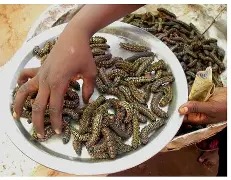Amid Nigeria’s economic challenges, nutrition experts have advised citizens to turn to affordable, locally available sources of protein as substitutes for increasingly expensive options like beef, chicken, and fish.
Former President of the Nutrition Society of Nigeria, Prof. Wasiu Afolabi, said many households are now struggling to meet their protein needs but stressed that several cheaper, highly nutritious foods can help prevent malnutrition.
Speaking in an interview, Afolabi pointed out that Nigerians have a long history of consuming protein-rich foods such as beans, soybeans, mushrooms, locust beans, and even edible insects—though many of these practices are fading with younger generations.
READ ALSO: Climate Change: Fishers Raise Alarm Over Insecurity On Seafood
“As for cooking, there are alternatives. These include beans, soybeans—which can be processed—and some unconventional protein sources such as edible insects,” he explained.
“There are several insects we used to consume that are rich in protein. There are also toads, snails, and mushrooms, which are valuable sources. Soybeans, in particular, are important because they can be processed into meat-like products and are very versatile.”
He further recommended lentils, crickets, termites, and fermented locust beans, especially when combined with ground crayfish, as cost-effective options for soups and stews. However, he acknowledged that crayfish, once a staple in Nigerian households, has also become expensive.
Supporting Afolabi’s position, Prof. Ignatius Onimawo, a Public Health Nutritionist and Vice-Chancellor of Ave Maria University, Abuja, emphasized the need for nutritional education. He said Nigerians can still achieve healthy diets without relying solely on costly animal proteins.
READ ALSO: Sallah Celebration: Kano Gov Donates Cows, Food Items To Prisons Inmates
“Things are expensive, but you can make it less expensive for yourself by choosing cheaper alternatives. With adequate information, Nigerians can prepare meals that are both affordable and nutritious,” Onimawo stated.
“If you do not eat meat, chicken, or fish on a particular day but you eat beans, groundnuts, or bambara nuts (okpa), you have still consumed protein. Though animal proteins are superior, the body can survive on plant-based options too.”
Both experts stressed that diversifying diets with traditional and plant-based protein sources could help households navigate the rising cost of food while safeguarding against malnutrition.
